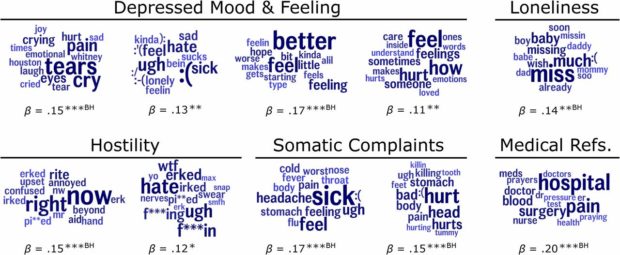Facebook language used to predict depression among users ahead of diagnosis

FILE – In this March 29, 2018, file photo, the logo for Facebook appears on screens at the Nasdaq MarketSite in New York’s Times Square. Facebook’s user base and revenue grew more slowly than expected in the second quarter of 2018 as the company grappled with privacy issues, sending its stock tumbling after hours. Image: AP/Richard Drew
A group of researchers from Princeton University conducted a study that showed how Facebook can be used to predict depression among its users ahead of first diagnosis. This was done by analyzing the language used in Facebook posts.
According to the study, which was published on the Proceedings of the National Academy of Sciences of the United States of America Journal last Oct. 15, language that is predictive of depression includes references to typical symptoms such as sadness, loneliness, hostility, rumination and increased self-reference.
The researchers accessed the history of Facebook statuses of consenting individuals to predict depression recorded in electronic medical records. In the 683 patients that participated, around 114 are known to have been diagnosed with depression in their records.
The research team built a prediction model to predict the future diagnosis of depression in the medical record. This was done by using the “text content of the Facebook posts, post length, frequency of posting, temporal posting patterns, and demographics.”
Depressed patients were identified with fair accuracy using only the language they used months before being first diagnosed of the mental illness. The researchers also found that when Facebook data is restricted to six months preceding first diagnosis, a higher prediction of accuracy was yielded. It was stated that it is possible to significantly predict future depression as far as three months before first diagnosis.
The researchers also identified 10 language topics most strongly associated with future depression. Words that fall under the group “Depressed Mood & Feeling” include “joy,” “tears,” “hate,” “hurt,” among others. Meanwhile, the words “bad,” “body,” “killing,” “sick” and “ugh” fell under Somatic Complaints.
“The profile of depression-associated language markers is nuanced, covering emotional (sadness, depressed mood), interpersonal (hostility, loneliness), and cognitive (self-focus, rumination) processes, which previous research has established as congruent with the determinants and consequences of depression,” the study read.

Image: Proceedings of the National Academy of Sciences of the United States of America
The use of first-person singular pronouns, such as “I,” “my” and “me” were also common among users diagnosed with depression, suggesting a “preoccupation with the self.”
The study comes as a revelation when held in the context of social media and its power and capacity when used and maximized in healthcare. When it comes to diagnosing depression, the Facebook language-based prediction models performed similarly to screening surveys used to identify patients with the mental illness.
The study suggests that, one day — if it isn’t so far into the future — the analysis of social media language could serve as a scalable front-line tool for the identification of depressed individuals. JB
RELATED STORIES:
‘Facebook depression’ fears unfounded — US Study